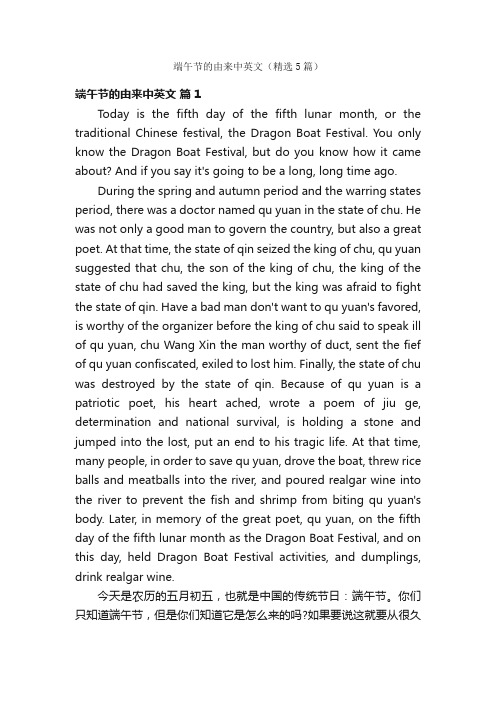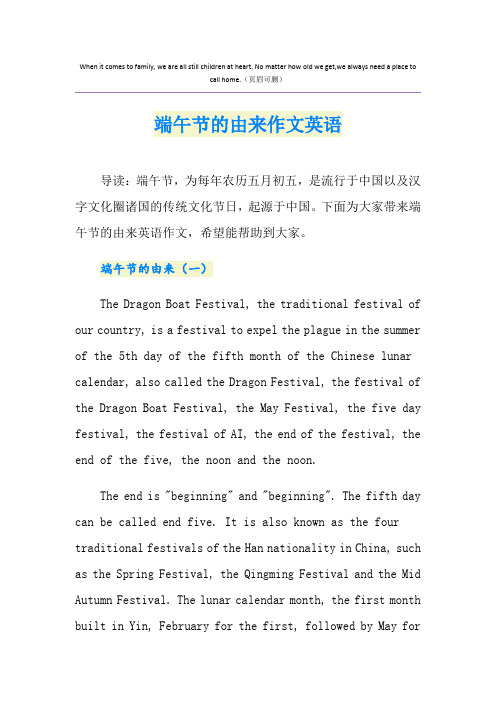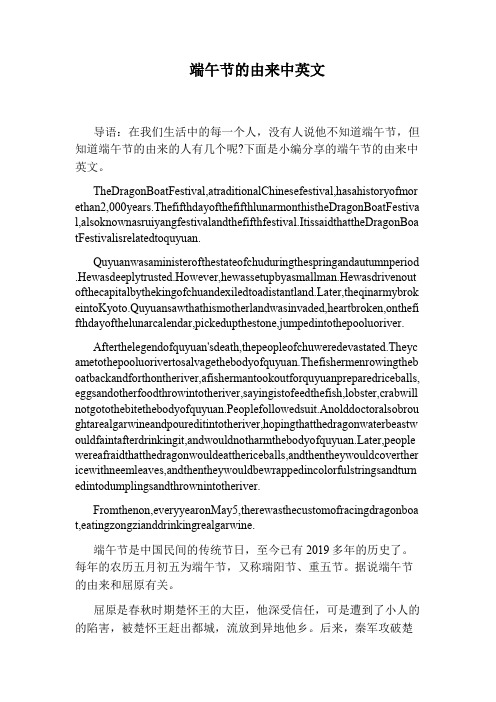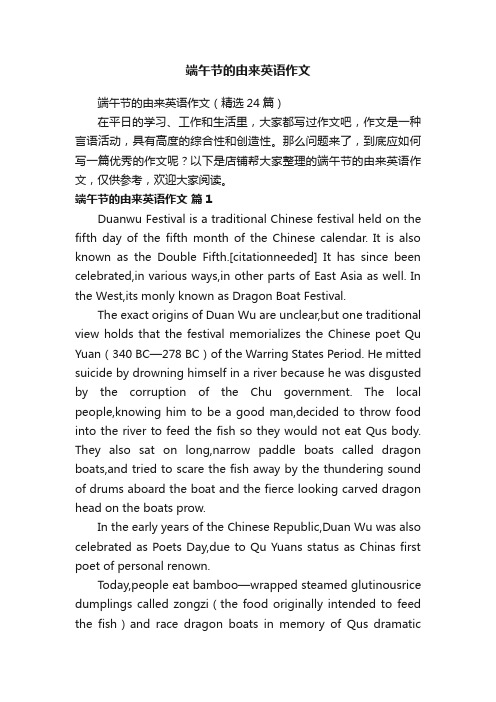端午节的由来(中英文)
端午节的由来(中英文)

端午节的由来(中英文)The Dragon Boat Festival, also called Double Fifth Festival, is celebrated on the fifth day of the fifth moon of the lunar calendar. It is one of the most important Chinese festivals, the other two being the Autumn Moon Festival and Chinese New Year.端午节,又称为五五节,因为端午节是在农历的五月五日,是三个重要的中国节庆之一,其他两个分别是中秋节和农历新年。
The origin of this summer festival centers around a scholarly government official named Chu Yuan. He was a good and respected man, but because of the misdeeds of jealous rivals he eventually fell into disfavor in the emperor's court.这个节日的由来是古代中国有一位博学多闻的官吏屈原,他是一位爱民而且又受到尊崇的官吏,但是由於一位充满嫉妒的官吏陷害,从此在朝廷中被皇帝所冷落。
由於无法获得皇帝的重视,屈原在忧郁的情况下投汨罗江自尽。
Unable to regain the respect of the emperor, in his sorrow Chu Yuan threw himself into the Mi Low river. Because of their admiration for Chu Yuan, the local people living adjacent to the Mi Lo River rushed into their boats to search for him while throwing rice into the waters to appease the river dragons.Although they were unable to find Chu Yuan, their efforts are still commemorated today during the Dragon Boat Festival.由於对屈原的爱戴,汨罗江畔的居民匆忙的划船在江内寻找屈原,并且将米丢入汨罗江中,以平息汨罗江中的蛟龙。
端午节的由来中英文(精选5篇)

端午节的由来中英文(精选5篇)端午节的由来中英文篇1Today is the fifth day of the fifth lunar month, or the traditional Chinese festival, the Dragon Boat Festival. You only know the Dragon Boat Festival, but do you know how it came about? And if you say it's going to be a long, long time ago.During the spring and autumn period and the warring states period, there was a doctor named qu yuan in the state of chu. He was not only a good man to govern the country, but also a great poet. At that time, the state of qin seized the king of chu, qu yuan suggested that chu, the son of the king of chu, the king of the state of chu had saved the king, but the king was afraid to fight the state of qin. Have a bad man don't want to qu yuan's favored, is worthy of the organizer before the king of chu said to speak ill of qu yuan, chu Wang Xin the man worthy of duct, sent the fief of qu yuan confiscated, exiled to lost him. Finally, the state of chu was destroyed by the state of qin. Because of qu yuan is a patriotic poet, his heart ached, wrote a poem of jiu ge, determination and national survival, is holding a stone and jumped into the lost, put an end to his tragic life. At that time, many people, in order to save qu yuan, drove the boat, threw rice balls and meatballs into the river, and poured realgar wine into the river to prevent the fish and shrimp from biting qu yuan's body. Later, in memory of the great poet, qu yuan, on the fifth day of the fifth lunar month as the Dragon Boat Festival, and on this day, held Dragon Boat Festival activities, and dumplings, drink realgar wine.今天是农历的五月初五,也就是中国的传统节日:端午节。
端午节的由来作文英语

When it comes to family, we are all still children at heart. No matter how old we get,we always need a place tocall home.(页眉可删)端午节的由来作文英语导读:端午节,为每年农历五月初五,是流行于中国以及汉字文化圈诸国的传统文化节日,起源于中国。
下面为大家带来端午节的由来英语作文,希望能帮助到大家。
端午节的由来(一)The Dragon Boat Festival, the traditional festival of our country, is a festival to expel the plague in the summer of the 5th day of the fifth month of the Chinese lunar calendar, also called the Dragon Festival, the festival of the Dragon Boat Festival, the May Festival, the five day festival, the festival of AI, the end of the festival, the end of the five, the noon and the noon.The end is "beginning" and "beginning". The fifth day can be called end five. It is also known as the four traditional festivals of the Han nationality in China, such as the Spring Festival, the Qingming Festival and the Mid Autumn Festival. The lunar calendar month, the first month built in Yin, February for the first, followed by May forthe noon, so called May is the noon, "Five" and "noon", "Five" and the number of Yang, so some places are called the Dragon Boat Festival in May, the festival, summer Festival. The Dragon Boat Festival is the traditional festival of the Chinese Han people. The essential activities of this day have gradually evolved into eating zongzi, racing dragon boat, hanging calamus, Artemisia, Artemisia, armavender, dahurian, drinking male yellow wine, making hundreds of seeds, making fragrant corners, sticking five poisonous drugs, putting yellow tobacco, and eating twelve red. It is said that eating zongzi and dragon boat racing is to commemorate Qu Yuan, so after the liberation, the Dragon Boat Festival was named "poet Festival" to commemorate Qu Yuan.Today, Dragon Boat Festival is still a very popular festival among the Chinese people. From 20__, we will take a day off for national holidays. The state attaches great importance to the protection of intangible cultural heritage. In May 20th of this year, the folk custom was approved by the State Council to be included in the first batch of national intangible cultural heritage list.端午节,我国传统节日,为每年农历五月初五,又称端阳节、午日节、五月节、五日节、艾节、端五、重午、午日,夏季的一个驱除瘟疫的节日.端是“开端”、“初”的意思,初五可以称为端五,与春节、清明节、中秋节并称为中国汉族的四大传统节日。
端午节的由来中英文

端午节的由来中英文导语:在我们生活中的每一个人,没有人说他不知道端午节,但知道端午节的由来的人有几个呢?下面是小编分享的端午节的由来中英文。
TheDragonBoatFestival,atraditionalChinesefestival,hasahistoryofmor ethan2,000years.ThefifthdayofthefifthlunarmonthistheDragonBoatFestiva l,alsoknownasruiyangfestivalandthefifthfestival.ItissaidthattheDragonBoa tFestivalisrelatedtoquyuan.Quyuanwasaministerofthestateofchuduringthespringandautumnperiod .Hewasdeeplytrusted.However,hewassetupbyasmallman.Hewasdrivenout ter,theqinarmybrok eintoKyoto.Quyuansawthathismotherlandwasinvaded,heartbroken,onthefi fthdayofthelunarcalendar,pickedupthestone,jumpedintothepooluoriver.Afterthelegendofquyuan'sdeath,thepeopleofchuweredevastated.Theyc ametothepooluorivertosalvagethebodyofquyuan.Thefishermenrowingtheb oatbackandforthontheriver,afishermantookoutforquyuanpreparedriceballs, eggsandotherfoodthrowintotheriver,sayingistofeedthefish,lobster,crabwill notgotothebitethebodyofquyuan.Peoplefollowedsuit.Anolddoctoralsobrou ghtarealgarwineandpoureditintotheriver,hopingthatthedragonwaterbeastw ouldfaintafterdrinkingit,ter,people wereafraidthatthedragonwouldeatthericeballs,andthentheywouldcoverther icewithneemleaves,andthentheywouldbewrappedincolorfulstringsandturn edintodumplingsandthrownintotheriver.Fromthenon,everyyearonMay5,therewasthecustomofracingdragonboa t,eatingzongzianddrinkingrealgarwine.端午节是中国民间的传统节日,至今已有2019多年的历史了。
端午节的来历介绍英文简短

端午节的来历介绍英文简短范文一:The origin of the Dragon Boat Festival can be traced back to the ancient Chinese legend of Qu Yuan, an honest and upright minister during the Warring States Period. He was framed by evil ministers and committed suicide by drowning himself in the Miluo River.The local people were touched by his loyalty and patriotism, and they raced dragon boats to search for his body.In memory of Qu Yuan, the people in southern China eat rice dumplings and hang calamus and mugwort on their doors and windows to drive away evil and ward off disease.This is how the Dragon Boat Festival came to be.译文:端午节的起源可以追溯到中国古代战国时期廉洁奉公的大臣屈原的传说。
为纪念屈原,江南百姓吃粽子,在门窗上悬挂菖蒲、艾草,以驱邪祛病,这就是端午节的由来。
范文二:The Dragon Boat Festival, also known as Duanwu Festival, is a traditional Chinese festival with a long history. It is celebrated on the fifth day of the fifth lunar month, usually in early summer. The festival originated from the ancient Chinese legend of Qu Yuan, an honest and upright minister during the Warring States Period.Qu Yuan was a loyal minister to the State of Chu, but he was framed by evil ministers and was forced to resign. He was so upset that he drowned himself in the Miluo River, where he was found by local people who were touched by his loyalty andpatriotism. To honor his memory, the local people held dragon boat races to search for his body and threw rice dumplings into the river to feed the fish, hoping to prevent them from eating Qu Yuan's body.Over time, these traditions evolved into the celebrations that we know today. During the Dragon Boat Festival, people race dragon boats, eat rice dumplings, and hang calamus and mugwort on their doors and windows to drive away evil and ward off disease. These activities not only pay tribute to Qu Yuan's loyalty and patriotism but also bring people together to enjoy the joy of the festival.译文:端午节又称端午节,是一个历史悠久的中国传统节日。
端午节的由来英语作文

端午节的由来英语作文端午节的由来英语作文(精选24篇)在平日的学习、工作和生活里,大家都写过作文吧,作文是一种言语活动,具有高度的综合性和创造性。
那么问题来了,到底应如何写一篇优秀的作文呢?以下是店铺帮大家整理的端午节的由来英语作文,仅供参考,欢迎大家阅读。
端午节的由来英语作文篇1Duanwu Festival is a traditional Chinese festival held on the fifth day of the fifth month of the Chinese calendar. It is also known as the Double Fifth.[citationneeded] It has since been celebrated,in various ways,in other parts of East Asia as well. In the West,its monly known as Dragon Boat Festival.The exact origins of Duan Wu are unclear,but one traditional view holds that the festival memorializes the Chinese poet Qu Yuan(340 BC—278 BC)of the Warring States Period. He mitted suicide by drowning himself in a river because he was disgusted by the corruption of the Chu government. The local people,knowing him to be a good man,decided to throw food into the river to feed the fish so they would not eat Qus body. They also sat on long,narrow paddle boats called dragon boats,and tried to scare the fish away by the thundering sound of drums aboard the boat and the fierce looking carved dragon head on the boats prow.In the early years of the Chinese Republic,Duan Wu was also celebrated as Poets Day,due to Qu Yuans status as Chinas first poet of personal renown.Today,people eat bamboo—wrapped steamed glutinousrice dumplings called zongzi(the food originally intended to feed the fish)and race dragon boats in memory of Qus dramaticdeath.端午节的由来英语作文篇2The dragon boat festival is a lunar holiday, occurring on the fifth day of the fifth lunar month.The chinese dragon boat festival is a significant holiday celebrated in china, and the one with the longest history. the dragon boat festival is celebrated by boat races in the shape of dragons. competing teams row their boats forward to a drumbeat racing to reach the finish end first.The boat races during the dragon boat festival are traditional customs to attempts to rescue the patriotic poet chu yuan. chu yuan drowned on the fifth day of the fifth lunar month in 277 b.c. chinese citizens now throw bamboo leaves filled with cooked rice into the water. therefore the fish could eat the rice rather than the hero poet. this later on turned into the custom of eating tzungtzu and rice dumplings. the celebrations is a time for protection from evil and disease for the rest of the year. it is done so by different practices such ashanging healthy herbs on the front door, drinking nutritious concoctions, and displaying portraits of evils nemesis, chung kuei. if one manages to stand an egg on its end at exactly 12:00 noon, the following year will be a lucky one.Dragon boat race traditions at the center of this festival are the dragon boat races. competing teams drive their colorful dragon boats forward to the rhythm of beating drums. these exciting races were inspired by the villagers valiant attempts to rescue chu yuan from the mi lo river. this tradition has remained unbroken for centuries.Tzung tzu a very popular dish during the dragon boat festival is tzung tzu. this tasty dish consists of rice dumplings with meat,peanut, egg yolk, or other fillings wrapped in bamboo leaves. the tradition of tzung tzu is meant to remind us of the village fishermen scatterinGrice across the water of the mi low river in order to appease the river dragons so that they would not devour chu yuan.Ay taso the time of year of the dragon boat festival, the fifth lunar moon, has more significance than just the story of chu yuan. many chinese consider this time of year an especially dangerous time when extra efforts must be made to protect their family from illness. families will hang various herbs, called ay tsao, on their door for protection. the drinking of realgar wine is thought to remove poisons from the body. hsiang bao are also worn. these sachets contain various fragrant medicinal herbs thought to protect the wearer from illness.端午节的由来英语作文篇3The Dragon Boat Festival, also called the Duanwu Festival,is celebrated on the fifth day of the fifth month according to the Chinese calendar. This festival is to commemorate the death of QU Yuan, an upright and honest poet and statesman who is said to have committed suicide by drowning himself in a river.The most important activity of this festival is the Dragon Boat races. It symboli zes people‘s attempts to rescue Qu Yuan. In the current period,these races also demonstrate the virtues of cooperation and teamwork.Besides, the festival has also been marked by eating zong zi (glutinous rice). Zong zi is made of glutinous rice stuffed with different fillings and wrapped in bamboo or reed leaves. People who mourned the death of Qu threw Zong zi into the river to feed his ghost every year.With the changes of the times, the memorial turns to be atime for protection from evil and disease for the rest of year. People will hang healthy herbs on the front door to clear the bad luck of the house. Although the significance of the festival might be different with the past,it still gives the observer an opportunity to glimpse a part of the rich Chinese cultural heritage.端午节的由来英语作文篇4阳光明媚的星期六,我们在家里过着一年一度的端午节。
端午节的前世今生(中英对照)
端午节的前世今生The Dragon Boat Festival, the 5th day of the 5th lunar month, has had a history of more than 2,000 years. It is usually in June in the Gregorian calendar.端午节是古老的传统节日,始于中国的春秋战国时期,至今已有2019多年历史。
There are many legends about the evolution of the festival, the most popular of which is in commemoration of Qu Yuan (340-278 BC). Qu Y uan was minister of the State of Chu and one of China's earliest poets. In face of great pressure from the powerful Qin State, he advocated enriching the country and strengthening its military forces so as to fight against the Qin. However, he was opposed by aristocrats headed by Zi Lan, and later deposed and exiled by King Huai.据《史记》“屈原贾生列传”记载,屈原,是春秋时期楚怀王的大臣。
他倡导举贤授能,富国强兵,力主联齐抗秦,遭到贵族子兰等人的强烈反对,屈原遭馋去职,被赶出都城,流放到沅、湘流域。
In his exiled days, he still cared much for his country and people and composed immortal poems including Li Sao (The Lament), Tian Wen (Heavenly Questions) and Jiu Ge (Nine Songs), which had far-reaching influences. In 278 BC, he heard the news that Qin troops had finally conquered Chu's capital, so he finished his last piece Huai Sha (Embracing Sand) and plunged himself into the Miluo River, clasping his arms to a large stone. The day happened to be the 5th of the 5th month in the Chinese lunar calendar.他在流放中,写下了忧国忧民的《离骚》、《天问》、《九歌》等不朽诗篇,独具风貌,影响深远(因而,端午节也称诗人节)。
端午节传说中英文版
The Dragon Boat Festival, also called the Duanwu Festival, is celebrated on the fifth day of the fifth month according to the Chinese calendar. For thousands of years, the festival has been marked by eating zong zi (glutinous rice(糯米)wrapped to form a pyramid using bamboo or reed leaves) and racing dragon boats.The festival is best known for its dragon-boat races, especially in the southern provinces where there are many rivers and lakes. Thisregatta(赛舟会)commemorates the death of Qu Yuan , an honest minister who is said to have committed suicide by drowning himself in a river. Qu was a minister of the State of Chu situated in present-day Hunan and Hubei provinces, during theWarring States Period(475-221BC)(战国时期). He was upright, loyal and highly esteemed for his wise counsel that brought peace and prosperity to the state. However, when a dishonest and corrupt prince vilified Qu, he was disgraced and dismissed from office. Realizing that the country was now in the hands of evil and corrupt officials, Qu grabbed a large stone and leapt into the Miluo River on the fifth day of the fifth month. Nearby fishermen rushed over to try and save him but were unable to even recover his body. Thereafter, the state declined and was eventually conquered by the State of Qin.The people of Chu who mourned the death of Qu threw rice into the river to feed his ghost every year on the fifth day of the fifth month. But one year, the spirit of Qu appeared and told the mourners that a hugereptile(爬行动物)in the river had stolen the rice. The spirit then advised them to wrap the rice in silk and bind it with five different-colored threads before tossing it into the river.During the Duanwu Festival, a glutinous rice pudding called zong zi is eaten to symbolize the rice offerings to Qu. Ingredients such as beans,lotus seeds(莲子),chestnuts(栗子), pork fat and the golden yolk of a salted duck egg are often added to the glutinous rice. The pudding is then wrapped with bamboo leaves, bound with a kind of raffia and boiled in salt water for hours.The dragon-boat races symbolize the many attempts to rescue and recover Qu's body. A typical dragon boat ranges from 50-100 feet in length, with a beam of about 5.5 feet, accommodating two paddlers seated side by side.A wooden dragon head is attached at the bow, and a dragon tail at thestern(船尾). A banner hoisted on a pole is also fastened at the stern and the hull is decorated with red, green and blue scales edged in gold. In the center of the boat is a canopied shrine behind which the drummers,gong(铜锣)beaters andcymbal(铙钹)players are seated to set the pace for the paddlers. There are also men positioned at the bow to set off firecrackers, toss rice into the water and pretend to be looking for Qu. All of the noise and pageantry creates an atmosphere of gaiety and excitement for the participants and spectators alike. The races are held among different clans, villages and organizations, and the winners are awarded medals, banners, jugs of wine and festive meals.端午节传说端午节来源于屈原端午节(Dragon Boat Festival),农历五月初五,又名端阳,端是“开端”、“开始”的意思。
端午节的来历英语版
端午节的来历英语版端午节的来历英语版 端午节历经⼏千年的历史淘洗,积累了丰富的⽂化内涵,是中国最重要的节⽇之⼀。
本⽂特意为⼤家收集整理了端午节的来历英语版,欢迎⼤家学习阅读! 端午节的来历英语版 The Dragon Boat Festival, the 5th day of the 5th lunar month, has had a history of more than 2,000 years. It is usually in June in the Gregorian calendar. 端午节是古⽼的传统节⽇,始于中国的春秋战国时期,⾄今已有2000多年历史。
There are many legends about the evolution of the festival, the most popular of which is in commemoration of Qu Yuan (340-278 BC). Qu Yuan was minister of the State of Chu and one of China's earliest poets. In face of great pressure from the powerful Qin State, he advocated enriching the country and strengthening its military forces so as to fight against the Qin. However, he was opposed by aristocrats headed by Zi Lan, and later deposed and exiled by King Huai. 据《史记》“屈原贾⽣列传”记载,屈原,是春秋时期楚怀王的⼤⾂。
他倡导举贤授能,富国强兵,⼒主联齐抗秦,遭到贵族⼦兰等⼈的强烈反对,屈原遭馋去职,被赶出都城,流放到沅、湘流域。
端午节的由来(中英文).doc
端午节的由来(中英文)The Dragon Boat Festival, also called Double Fifth Festival, is celebrated on the fifth day of the fifth moon of the lunar calendar. It is one of the most important Chinese festivals, the other two being the Autumn Moon Festival and Chinese New Year.端午节,又称为五五节,因为端午节是在农历的五月五日,是三个重要的中国节庆之一,其他两个分别是中秋节和农历新年。
The origin of this summer festival centers around a scholarly government official named Chu Yuan. He was a good and respected man, but because of the misdeeds of jealous rivals he eventually fell into disfavor in the emperor's court.这个节日的由来是古代中国有一位博学多闻的官吏屈原,他是一位爱民而且又受到尊崇的官吏,但是由於一位充满嫉妒的官吏陷害,从此在朝廷中被皇帝所冷落。
由於无法获得皇帝的重视,屈原在忧郁的情况下投汨罗江自尽。
Unable to regain the respect of the emperor, in his sorrow Chu Yuan threw himself into the Mi Low river. Because of their admiration for Chu Yuan, the local people living adjacent to the Mi Lo River rushed into their boats to search for him while throwing rice into the waters to appease the river dragons.Although they were unable to find Chu Yuan, their efforts are still commemorated today during the Dragon Boat Festival.由於对屈原的爱戴,汨罗江畔的居民匆忙的划船在江内寻找屈原,并且将米丢入汨罗江中,以平息汨罗江中的蛟龙。
- 1、下载文档前请自行甄别文档内容的完整性,平台不提供额外的编辑、内容补充、找答案等附加服务。
- 2、"仅部分预览"的文档,不可在线预览部分如存在完整性等问题,可反馈申请退款(可完整预览的文档不适用该条件!)。
- 3、如文档侵犯您的权益,请联系客服反馈,我们会尽快为您处理(人工客服工作时间:9:00-18:30)。
端午节的由来(中英文)
The Dragon Boat Festival, also called Double Fifth Festival, is celebrated on the fifth day of the fifth moon of the lunar calendar. It is one of the most important Chinese festivals, the other two being the Autumn Moon Festival and Chinese New Year.
端午节,又称为五五节,因为端午节是在农历的五月五日,是三个重要的中国节庆之一,其他两个分别是中秋节和农历新年。
The origin of this summer festival centers around a scholarly government official named Chu Yuan. He was a good and respected man, but because of the misdeeds of jealous rivals he eventually fell into disfavor in the emperor's court.
这个节日的由来是古代中国有一位博学多闻的官吏屈原,他是一位爱民而且又受到尊崇的官吏,但是由於一位充满嫉妒的官吏陷害,从此在朝廷中被皇帝所冷落。
由於无法获得皇帝的重视,屈原在忧郁的情况下投汨罗江自尽。
Unable to regain the respect of the emperor, in his sorrow Chu Yuan threw himself into the Mi Low river. Because of their admiration for Chu Yuan, the local people living adjacent to the Mi Lo River rushed into their boats to search for him while throwing rice into the waters to appease the river dragons.
Although they were unable to find Chu Yuan, their efforts are still commemorated today during the Dragon Boat Festival.
由於对屈原的爱戴,汨罗江畔的居民匆忙的划船在江内寻找屈原,并且将米丢入汨罗江中,以平息汨罗江中的蛟龙。
即使他们当时并没有找到屈原,但是他们的行为,直到今天在端午节的时候,仍然被人们传颂纪念著。
端午节风俗习惯
Dragon Boat race Traditions At the center of this festival are the dragon boat races. Competing teams drive their colorful dragon boats forward to the rhythm of beating drums. These exciting races were inspired by the villager's valiant attempts to rescue Chu Yuan from the Mi Lo river. This tradition has
remained unbroken for centuries.
Tzung Tzu A very popular dish during the Dragon Boat festival is tzung tzu. This tasty dish consists of rice dumplings with meat, peanut, egg yolk, or other fillings wrapped in bamboo leaves. The tradition of tzung tzu is meant to remind us of the village fishermen scattering rice across the water of the Mi Low river in order to appease the river dragons so that they would not devour Chu Yuan.
Ay Taso The time of year of the Dragon Boat Festival, the fifth lunar moon, has more significance than just the story of Chu Yuan. Many Chinese consider this time of year an especially dangerous time when extra efforts must be made to protect their family from illness. Families will hang various herbs, called Ay Tsao, on their door for protection. The drinking of realgar wine is thought to remove poisons from the body. Hsiang Bao are also worn. These sachets contain various fragrant medicinal herbs thought to protect the wearer from illness.
风俗习惯端午节最重要的活动是龙舟竞赛,比赛的队伍在热烈的鼓声中划著他们多彩的龙舟前进。
这项活动的灵感是来自於当时汨罗江畔的居民,在江中划船救屈原,而这个传统也一直保持了数个世纪。
在端午节时受欢迎的食物就是粽子,粽子是以米包著肉、花生、蛋黄及其他材料,再以竹叶包裹。
而粽子的传统则来由於汨罗江边的渔夫,将米丢入江中平息江中的蛟龙,希望他们不要将屈原吃掉。
农历的五月,也就是端午节的这个时节,对中国人而言,除了屈原的故事还有许多其他重要的意义。
许多中国人相信五月是一年中容易引发疾病的危险时节,因此必须有许多防备家人生病的措施。
许多家庭会将一种特别的植物-艾草挂在门口,作为保护之用,而人们也会挂带香包,它是以含有多种香味的药用植物所做成,也可以保护人们远离疾病。
农历五月初五端午节,是我国最大的传统节日之一。
端午亦称端五,“端”的意思和“初”相同,称“端五”也就如称“初五”;端五的“五”字又与“午”相通,按地支顺序推算,五月正是“午”月。
又因午时为“阳辰”,所以端五也叫“端阳”。
五月五日,月、日都是五,故称重五,也称重午。
此外,端午还有许多别称,如:夏节、浴兰节、女儿节,天中节、地腊、诗人节等等。
端午节的别称之多,间接说明了端午节俗起源的歧出。
事实也正是这样的。
关于端午节的来源,时至今日至少有四、五种说法,诸如:纪念屈原说;吴越民族图腾祭说;
起于三代夏至节说;恶月恶日驱避说,等等。
迄今为止,影响最广的端午起源的观点是纪念屈原说。
在民俗文化领域,我国民众把端午节的龙舟竞渡和吃粽子都与屈原联系起来。
传说屈原投江以后,当地人民伤其死,便驾舟奋力营救,因有竞渡风俗;又说人们常放食品到水中致祭屈原,但多为蛟龙所食,后因屈原的提示才用楝树叶包饭,外缠彩丝,做成后来的粽子样。
端午节的习俗主要有:吃粽子于门上插艾或菖蒲驱邪,系长命缕,饮雄黄酒或以之消毒,赛龙舟等等。
粽子又叫“角黍”、“筒粽”,前者是由于形状有棱角、内裹粘米而得名,后者顾名思义大概是用竹筒盛米煮成。
端午节吃粽子,在魏晋时代已经很盛行。
这种食品是在每年端午和夏至两个节日里食用。
粽子还是一种节日往来的礼品。
到了唐宋时期,粽子已极为有名,市场上常有粽子卖。
现在,我们过端午节仍然免不了要吃几只粽子。
粽子有不少花样,有南北之别,东西之分。
南方常用红枣、花生、咸肉等混在糯米中制成,也多见不杂别的食品,而去品味粽叶的清香的;北方多以枣、果脯等作为粽子的馅心。
小小的粽子,似乎已经成了中国传统的象征,在人们心中占据着一定的位置.过去端午节还有躲午的习俗,此种习俗源于一种信仰,即:五月为“恶月”,瘟疮蔓延,重五是个不吉利的日子,所以父母都于是日将未满周岁的儿女带往外婆家躲避,以逃脱灾祸,故称躲午。
这无疑是古代科学不发达而产生的观念,因为五月酷暑将至,蚊虫滋生,在没有医疗卫生设备的民间,容易发生传染病,遂给人们带来一种恐惧心理,于是产生躲午习俗,如今这一节日的一些古老习俗已经随着社会变迁而消失了,但吃粽子、赛龙舟等习俗仍然流行。
